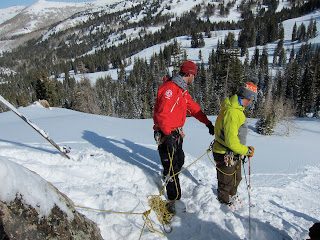In the last week of January, 2012, I participated in the American Mountain Guide Association's Ski Guide Course as precedent to a Ski Mountaineering guide certification. It is the first of a series of four grueling multi-day courses in which you are tested and scrutinized in the field and in the classroom by a team of supremely gifted and highly qualified instructors for ten hours a day with little thought given to a proper lunch or snack break. In this case, I was tortured and tested for 12 days straight, mostly in the backcountry terrain of Big Cottonwood and Little Cottonwood canyons just outside Salt Lake City, Utah. Not only did I have to contend with a nagging knee injury and poor stamina throughout the course (and a lack of confidence in the midst of an accomplished group of skiers and climbers), but also the worst snowpack in Utah in recent memory. On our second day, we were treated to a stability analysis by a local avalanche forecaster, Drew Hardesty, who works under Bruce Tremper, director of the Utah Avalanche Center, and one of the world's preeminent snow scientists. Drew shared with us his intimate knowledge of the region's snowpack, which consisted of several dense layers of heavily loaded slabs, recently deposited by a powerful storm, sitting on a full 70cm layer of faceted snow (or "total shit" as he would put it), the worst he had ever seen. Not the kind of information you want to hear at the outset of a program which would require us to spend the majority of our waking hours travelling over the surface of this very snowpack. He accurately predicted a period of heavy avalanche activity and almost certain fatalities in the days ahead. Indeed, several skiers and snowboarders were caught over the next few days, most narrowly escaping serious injury and death. The one exception was a single snowboarder, caught and fatally wounded in a massive slide in a canyon adjacent to ours on the fourth day of class.
The imminent danger that was hanging over us magnified the importance of the skills being taught in our class, which focused primarily on leading and protecting clients in the backcountry, while practicing good decision-making and minimizing risk whenever possible. We studied weather and terrain, snow stability and hazard evaluation, track setting and backcountry navigation, rapelling and belaying, raising and lowering, short roping and short pitching, rescue sled and emergency snow shelter construction. The group consisted of a variety of students, each with different backgrounds, strengths and weaknesses, which we would use to our collective advantage. Several were expert skiers or heli guides; some were serious alpinists or rock climbers; others were guides or instructors themselves, and a few were, like myself, just hard-core recreationalists. At least one (my housemate) had summited Everest. Another skiied regularly with some of the most famous skiers in the world, and had played a part in one of my favorite ski documentaries. Others were involved in projects that defied imagination, including one who was intent on climbing all 50 of North America's most dangerous routes, an elusive goal and one which has apparently never been completed (he is currently on climb #37). Yes, this was the company I was keeping, whom I would lead on tours and sleep on the floor of backcountry yurts with...intimidating to say the least. Still, I perservered, and managed to complete the course to the satisfaction of my instructors, with only a few minor failings, which will have to be made up at some future date. I don't know yet if I have it in me to be a mountaineering guide, or if there is even a job out there for me somewhere after my training. But, at a minimum, if the wide range of backcountry skills I learned in the process helps to keep me alive in my future exploits, it was time (and money) well spent.
The imminent danger that was hanging over us magnified the importance of the skills being taught in our class, which focused primarily on leading and protecting clients in the backcountry, while practicing good decision-making and minimizing risk whenever possible. We studied weather and terrain, snow stability and hazard evaluation, track setting and backcountry navigation, rapelling and belaying, raising and lowering, short roping and short pitching, rescue sled and emergency snow shelter construction. The group consisted of a variety of students, each with different backgrounds, strengths and weaknesses, which we would use to our collective advantage. Several were expert skiers or heli guides; some were serious alpinists or rock climbers; others were guides or instructors themselves, and a few were, like myself, just hard-core recreationalists. At least one (my housemate) had summited Everest. Another skiied regularly with some of the most famous skiers in the world, and had played a part in one of my favorite ski documentaries. Others were involved in projects that defied imagination, including one who was intent on climbing all 50 of North America's most dangerous routes, an elusive goal and one which has apparently never been completed (he is currently on climb #37). Yes, this was the company I was keeping, whom I would lead on tours and sleep on the floor of backcountry yurts with...intimidating to say the least. Still, I perservered, and managed to complete the course to the satisfaction of my instructors, with only a few minor failings, which will have to be made up at some future date. I don't know yet if I have it in me to be a mountaineering guide, or if there is even a job out there for me somewhere after my training. But, at a minimum, if the wide range of backcountry skills I learned in the process helps to keep me alive in my future exploits, it was time (and money) well spent.

















